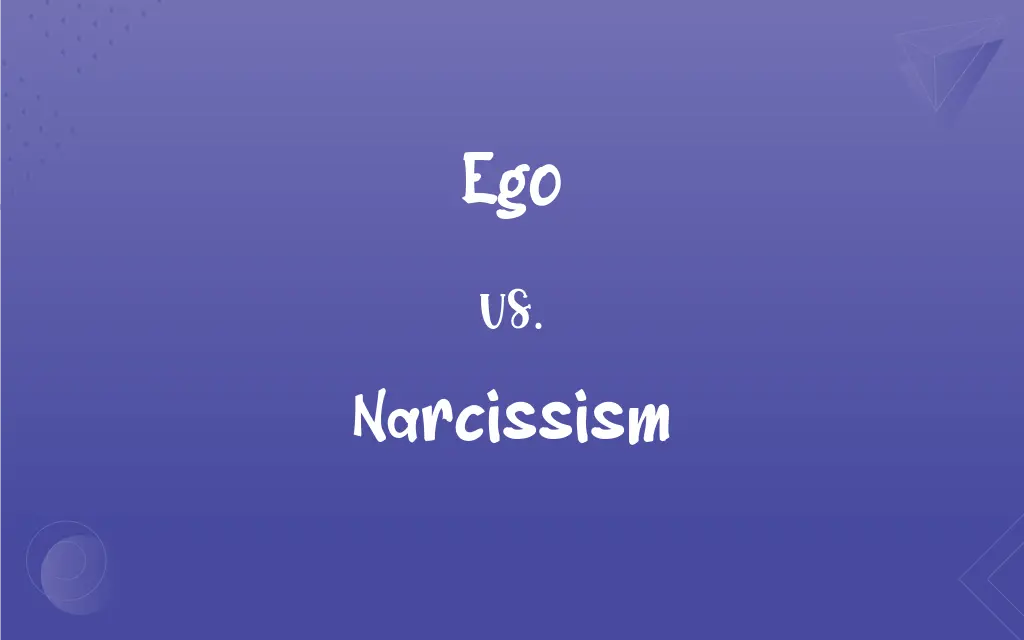Ego vs. Narcissism: What's the Difference?
By Aimie Carlson || Updated on May 24, 2024
Ego is a person's sense of self-esteem or self-importance, while narcissism is an excessive interest in oneself and one's physical appearance, often at the expense of empathy for others.

Key Differences
Ego refers to an individual's sense of self-worth and self-esteem. It plays a crucial role in how people perceive themselves and interact with the world. Narcissism, on the other hand, is characterized by an excessive focus on oneself, often coupled with a lack of empathy for others. This self-obsession can manifest in various behaviors that prioritize personal needs and desires over those of others.
A healthy ego helps individuals maintain a balanced self-image and confidence. It enables people to navigate social interactions and personal challenges effectively. Narcissism, however, is often seen as a pathological condition where one's self-love and admiration overshadow the ability to form meaningful relationships.
While ego can be positive and constructive, fostering resilience and ambition, narcissism tends to be destructive. Narcissistic individuals may exhibit manipulative behavior, a need for constant admiration, and an inflated sense of superiority, which can harm personal and professional relationships.
Ego is a normal aspect of personality development and is essential for self-identity. Narcissism, however, can lead to significant interpersonal difficulties and is often associated with narcissistic personality disorder (NPD), a mental health condition that requires professional intervention.
The concept of ego is rooted in psychological theories, particularly those of Freud, who viewed it as part of the human psyche balancing primal desires and moral standards. Narcissism derives from the myth of Narcissus and is studied in the context of personality disorders, focusing on its impacts on behavior and social dynamics.
ADVERTISEMENT
In everyday language, having a "big ego" may refer to someone with high self-confidence or assertiveness. Calling someone a narcissist, however, implies a deeper, often negative, trait of self-centeredness and lack of regard for others' feelings.
Comparison Chart
Definition
Sense of self-esteem or self-importance
Excessive interest in oneself and one's appearance
Nature
Can be positive or neutral
Generally considered negative and pathological
Psychological Role
Balances self-perception and social interactions
Often disrupts relationships and empathy
Development
Normal part of personality development
Can lead to narcissistic personality disorder
ADVERTISEMENT
Cultural Reference
Freud's theory of the psyche
Myth of Narcissus, psychological studies
Ego and Narcissism Definitions
Ego
Sense of self-esteem.
Her strong ego helped her succeed in business.
Narcissism
Excessive self-love.
His narcissism made it hard for him to form close relationships.
Ego
Part of the psyche mediating desires and reality.
According to Freud, the ego balances the id and superego.
Narcissism
Preoccupation with oneself.
Her narcissism was evident in her constant need for admiration.
Ego
Self-importance.
He has a big ego but is very talented.
Narcissism
Inflated sense of superiority.
Narcissism can result in an unrealistic self-image.
Ego
Confidence in one's abilities.
A healthy ego is crucial for personal development.
Narcissism
Lack of empathy for others.
Narcissism often leads to disregard for others' feelings.
Ego
The self, especially as distinct from the world and other selves.
Narcissism
Personality disorder characterized by self-obsession.
Narcissistic personality disorder requires professional treatment.
Ego
In psychoanalytic theory, the division of the psyche that is conscious, is responsible for our feelings of selfhood, and most directly interacts with external reality.
Narcissism
Excessive preoccupation with or admiration of oneself.
Ego
An exaggerated sense of self-importance; conceit.
Narcissism
A personality disorder characterized by an exaggerated sense of self-importance, need for admiration, and lack of empathy. Also called narcissistic personality disorder.
Ego
Appropriate pride in oneself; self-esteem.
Narcissism
Pleasure derived from contemplation or admiration of one's own body or self, considered in psychoanalytic theory to be a fixation on or a regression to an infantile stage of development.
Ego
The self, especially with a sense of self-importance.
Narcissism
Excessive love of oneself.
Ego
The most central part of the mind, which mediates with one's surroundings.
Narcissism
Sexual desire for one's own body.
Ego
The conscious and permanent subject of all psychical experiences, whether held to be directly known or the product of reflective thought; the subject consciously considered as "I" by a person; - opposed to non-ego.
Narcissism
An exceptional interest in and admiration for oneself.
Ego
That one of the three parts of a person's psychic apparatus that mediates consciously between the drives of the id and the realities of the external physical and social environment, by integrating perceptions of the external world and organizing the reactions to it. Contrasted with the id and superego.
Narcissism
An exceptional interest in and admiration for yourself
Ego
Egotism; as, a job requiring a diplomat without too much ego.
Ego
Self-esteem; as, he has an overinflated ego.
Ego
An inflated feeling of pride in your superiority to others
Ego
Your consciousness of your own identity
Ego
(psychoanalysis) the conscious mind
Ego
Self-perception and identity.
His ego was bruised after the criticism.
FAQs
What is ego?
Ego is a person's sense of self-esteem or self-importance.
What is narcissism?
Narcissism is an excessive interest in oneself and one's physical appearance.
Is narcissism a mental disorder?
Narcissism can be part of narcissistic personality disorder (NPD).
How does ego affect behavior?
A healthy ego can boost confidence and resilience.
Can ego be positive?
Yes, a balanced ego is crucial for personal growth and social interactions.
What are the roots of the concept of ego?
Ego is a key concept in Freud's psychoanalytic theory.
Can ego be controlled?
Yes, through self-awareness and emotional regulation.
Are all self-centered people narcissists?
Not necessarily; narcissism involves a pathological level of self-focus.
Can narcissism be treated?
Yes, usually through therapy.
Can ego be negative?
If too inflated, it can lead to arrogance and interpersonal conflicts.
How do ego and self-confidence relate?
A healthy ego supports self-confidence.
What causes narcissism?
It can stem from a combination of genetic, environmental, and psychological factors.
How can one develop a healthy ego?
Through self-reflection, constructive feedback, and emotional intelligence.
How does narcissism manifest?
Through behaviors like self-centeredness, a need for admiration, and lack of empathy.
Is narcissism always negative?
Generally, yes, because it disrupts relationships and empathy.
Does everyone have an ego?
Yes, it is a fundamental aspect of personality.
How does ego impact social interactions?
A healthy ego facilitates positive interactions, while an inflated ego can hinder them.
Is it possible to have a balanced ego?
Yes, with self-awareness and emotional maturity.
Is narcissism linked to success?
It can be, but often at the cost of personal relationships.
Can narcissism be diagnosed?
Yes, typically by a mental health professional.
About Author
Written by
Aimie CarlsonAimie Carlson, holding a master's degree in English literature, is a fervent English language enthusiast. She lends her writing talents to Difference Wiki, a prominent website that specializes in comparisons, offering readers insightful analyses that both captivate and inform.































































